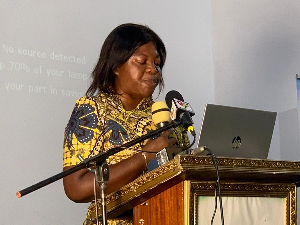 Minister for Science, Technology, and Innovation, Ophelia Mensah Hayford
Minister for Science, Technology, and Innovation, Ophelia Mensah Hayford
The Minister for Science, Technology, and Innovation, Ophelia Mensah Hayford, has proclaimed that the government is diligently working to develop policies aimed at eliminating harmful chemicals and emissions that endanger human health and the environment.
In a recent press interview held during the launch of the Agroecology and Circular Economy for Ecosystem Services (ACE4ES) event, organized by CSIR-CRI and funded by the Climate and Clean Air Coalition (CCAC) under the United Nations Environment Programme (UNEP), Ophelia Mensah Hayford highlighted the significance of implementing sustainable practices.
The event's theme, "Adopting Agroecology and Circular Economy for Emission Reduction in Maize and Rice Production," underscored the government's dedication to promoting environmentally friendly initiatives.
She expressed her full support for the ACE4ES project, emphasizing its potential to decrease the use of harmful chemicals in maize and rice production.
She stated that the initiative is expected to have a positive impact on both the environment and human health, aligning with the government's commitment to fostering a cleaner and healthier future for all.
"Whenever scientists research and bring up a project, it informs policy decision-making. Consequently, the government is eager to develop policies aimed at phasing out harmful chemicals and emissions that pose risks to human health," she explained.
"We’re going to go by the ACE4ES Project to keep the rich nutrients in our lands. And by so doing, we can also live longer," she added.
Ophelia Mensah Hayford, however, called on all Ghanaians to actively support the CSIR-CRI innovation in order to decrease the use of harmful chemicals that have adverse effects on both people and the environment.
"Let’s all campaign vigorously against harmful chemicals that affect humanity and the environment," she entreated.
Giving a brief explanation of the ACE4ES Project, Dr. Onwona-Hwesofour, the Lead and Principal Investigator of the ACE4ES, revealed that the primary goal of the project is to reduce emissions in rice and maize production as well as decrease black carbon levels that contribute to hot weather conditions in Ghana and across Africa.
The ACE4ES project is set to span two years, with the first year focusing on implementation in Ghana, followed by expansion to Benin, Nigeria, and Tanzania in the second year.
Dr. Onwona-Hwesofour also mentioned that there are plans to extend the ACE4ES project to other African countries beyond the initial two-year period, pending additional funding from foreign nations.